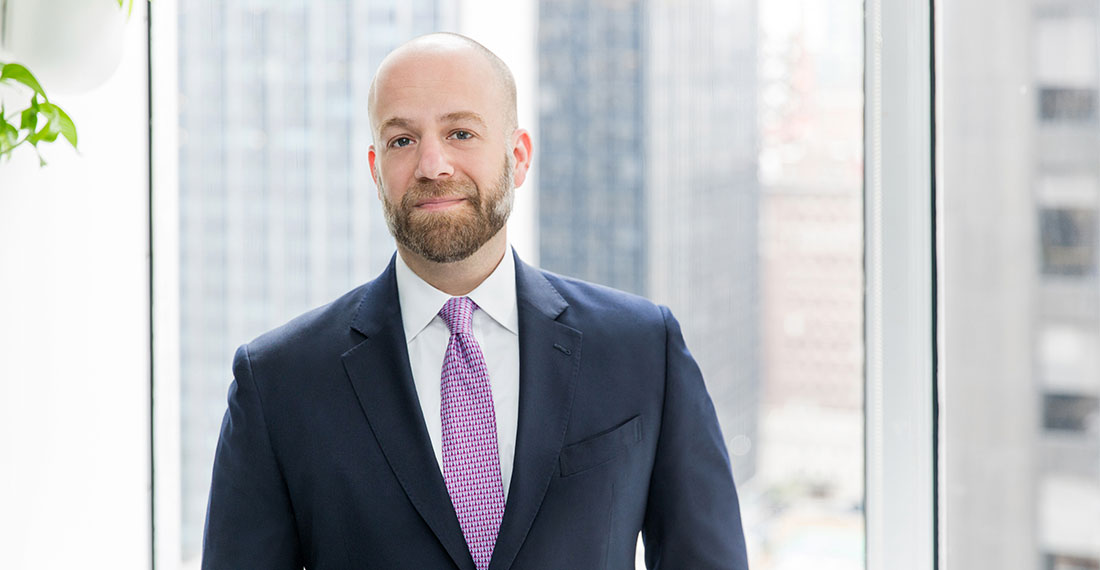(Excerpts from this Q&A were originally published in Lawdragon)
A litigator with particular expertise in the financial arena, Joshua Margolin clerked at the Delaware Court of Chancery and spent several years at top-tier Big Law firms before joining breakout litigation firm Selendy & Gay two years ago. His practice often brings him back to Delaware to hammer out corporate governance issues and other areas of business law.
Margolin handled touchstone litigation stemming from the 2008 financial crisis, achieving a $650M settlement for AIG in the closely-watched securities fraud case against Bank of America over the bank’s sales of shoddy residential mortgage-backed securities.
Like the rest of the world, his work was impacted by the Covid-19 pandemic, with a case he had been litigating on behalf of McKinsey moving to the virtual realm halfway through. He is also keeping watch for how the courts will treat mergers and acquisitions that were pending during the pandemic and are now, perhaps, being rethought.
Lawdragon: Will you describe for our readers the mix of work you do within your practice?
Joshua Margolin: I focus on complex commercial cases with a specialty in financial products and corporate governance, although I’ve litigated everything from disputes concerning mergers and acquisitions to real estate. I spent years involved in residential mortgage-backed securities litigation, including fraud claims brought by Fortune 500 companies against the world’s largest banks as well as representation and warranty claims brought on behalf of investors. I have also represented plaintiffs and defendants in corporate governance actions before the Delaware Court of Chancery, including for alleged breaches of fiduciary duty and waste. It’s especially gratifying for me to get to do this kind of work after serving as a clerk for both Chancellor William B. Chandler and Vice-Chancellor John W. Noble, during which time I was fortunate to work on the In re Walt Disney Co. Derivative Litigation trial. You’ve never truly seen a witness testify until you’ve watched Sidney Poitier tell his life story on the stand!
LD: That must have been incredible. What’s on your plate these days?
JM: My current docket consists of a good mix of cases. I am defending McKinsey & Company’s restructuring arm against suits brought by Jay Alix, the founder of AlixPartners, challenging McKinsey’s disclosure practices. These cases involve issues that are fundamental to bankruptcy practitioners and could have nationwide impact. Additionally, I am part of the team that brought claims against various crypto token issuers and exchanges for selling unregistered securities. These cases have the potential to change the regulatory landscape for these products in favor of investors.
LD: You’ll have to keep us updated on crypto case. Can you walk us through Alix’s claims against McKinsey and where those cases are at?
JM: There are numerous litigations, including one matter that’s halfway through trial in the Bankruptcy Court for the Southern District of Texas. The dispute centers around Alix’s claims that McKinsey, in its capacity as a bankruptcy professional, did not disclose certain connections to interested parties in retention applications and, therefore, its retention cannot be approved by the court. We had eight days of trial and were midway through the case when Covid-19 came rolling through. At that point, the proceedings shifted to a remote environment. We’ve conducted status conferences and argued motions virtually; it helps that the presiding judge is very technologically savvy. Operating at a rapid clip from discovery through trial, and then into the uncharted waters of remote litigation, has been incredibly exciting.
LD: Are you seeing any significant shifts in your practice connected to the Covid-19 pandemic?
JM: We are seeing more cases being brought addressing pending mergers and acquisitions, and specifically whether parties can be held to certain deals in light of current circumstances. Traditionally, it has been nearly impossible for a buyer to successfully assert a material adverse effect [“MAE”] in order to exit a pending transaction, with buyers typically shouldering systemic risks like recession and war, and sellers shouldering business-specific risks like the loss of a major contract. An MAE has only been found once in Delaware. It will be fascinating to see how courts address whether Covid-19 and its effects are sufficient to create an MAE and allow a buyer to exit a deal.
LD: Are you involved in any pro bono cases that have been particularly meaningful to you?
JM: My longest-running pro bono matter is my representation of Vote Solar, a national non-profit public advocacy organization, in its intervention in a Utah ratemaking proceeding to ensure that net export rates for customer-generated solar energy are fair and reasonable. We have created a state-of-the-art template to value solar exports, and are the first intervenors to prepare such a rigorously developed rate proposal rather than simply responding to the utilities’ dramatically undervalued rate proposal. A fair purchase price for these exports provides a critical incentive for customers to install solar panels, which is not just an environmentally responsible decision, but is also one that gives consumers and communities more control over their own energy.
I am also on the committee for the New York City Bar Lawyer Assistance Program, which provides resources and support to members of the legal community who are struggling with mental health issues. It’s our mission to erase the stigma surrounding mental health and to facilitate honest conversations and programs that will improve wellness in the practice of law.
Read the full interview in Lawdragon.


